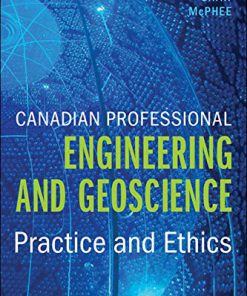Business and Professional Ethics 9th Edition by Leonard J Brooks, Paul Dunn ISBN 9780357441886 0357441885
$50.00 Original price was: $50.00.$25.00Current price is: $25.00.
Business and Professional Ethics 9th Edition by Leonard J Brooks, Paul Dunn – Ebook PDF Instant Download/Delivery: 9780357441886 ,0357441885
Full download Business and Professional Ethics 9th Edition after payment

Product details:
ISBN 10: 0357441885
ISBN 13: 9780357441886
Author: Leonard J Brooks, Paul Dunn
Business and Professional Ethics 9th Edition Table of contents:
Chapter 1. Ethics Expectations
The Ethics Environment for Business: The Battle for Credibility, Reputation, & Competitive Advantage
Environmental Concerns
Moral Sensitivity
Bad Judgments & Activist Stakeholders
Economic & Competitive Pressures
Financial Scandals: The Expectations Gap & the Credibility Gap
Governance Failures & Risk Assessment
Increased Accountability & Transparency Desired
Synergy among Factors & Institutional Reinforcement
Outcomes
New Expectations for Business
New Mandate for Business
New Governance & Accountability Frameworks
Reinforced Fiduciary Role for Professional Accountants
Responses & Developments
Emerging Governance & Stakeholder Accountability Models
Management Based on Values, Reputation, & Risks
Accountability
Ethical Behavior & Developments in Business Ethics
The Ethics Environment for Professional Accountants
Role & Conduct
Governance
Services Offered
Managing Ethics Risks & Opportunities
Developing a Culture of Integrity
Corporate Governance
Questions
Reading Insights
References
Case Insights
Cases Involving Improper Behavior
Advertising & Sales Promotion Cases
Cases Involving Financial Transactions
Cases Involving the Control of Information
Cases Concerning the Environment
Product Safety Cases
Accounting & Auditing Cases
Chapter 2. Ethics & Governance Scandals
Ethics & Governance: A Time Line of Important Events
Ethics & Governance: The Early Developments Prior to 1970
Ethics & Governance: 1970–1990
Ethics & Governance: The Modern ERA—1990 to the Present
Significant Ethics & Governance Scandals & Events
Enron—A Failure of the Board of Directors
Arthur Andersen—An Organizational Culture Gone Awry
WorldCom—Power in the Hands of One Man
Crisis of Confidence
Sarbanes-Oxley Act—Closing the Barn Door
Tax Shelters—Not in the Public Interest
Subprime Mortgage Meltdown—Greed without Due Diligence
Dodd-Frank Wall Street Reform and Consumer Protection Act
Bernard Madoff—If It’s Too Good to Be True
Public Disillusionment: The Occupy Movement
Shareholder Disillusionment: Shareholder Resolutions
The LIBOR Scandal: How Banks Manipulated a Benchmark Interest Rate
Bribery Attracts Prosecutions and Huge Fines
Automaker’s Sins Come Home to Roost
Drugmakers Raise Prices, Gouging Patients
New Emphasis on Individual Accountability for Corporate Wrongdoing
Panama Papers & Paradise Papers Eliminate Secrecy on Offshore Tax Evasion
Unethical Bank Cultures Produce Scandals
#MeToo Movement Reaches a Tipping Point
Harmful Products Draw Huge Settlements and Change Perspectives
Accounting Crises Lead to Reimagination of Professional Accountant’s Role
U.S. Business Roundtable Statement Signals Acceptance of Stakeholder Interests
Signs of Ethical Collapse
Ethics & Governance: Trends
Ethics & Governance: Timetables of Important Events, 1929–2019
Useful Videos & Films
Questions
Case Insights
Chapter 3. Ethical Behavior—Philosophers’ Contributions
Ethics & Moral Codes
Ethics & Business
Self-Interest & Economics
Ethics, Business, & The Law
Major Ethical Theories Useful in Resolving Ethical Dilemmas
Teleology: Utilitarianism & Consequentialism—Impact Analysis
Deontological Ethics—Motivation for Behavior
Justice & Fairness—Examining the Balance
Virtue Ethics—Analysis of the Virtue Expected
Moral Imagination
Questions
Case Insights
Useful Video & Film
References
Cases Involving Improper Behavior
Chapter 4. Practical Ethical Decision Making
Introduction
Motivating Developments for Ethical Learning
Ethical Decision Making Framework—An Overview
Philosophical Approaches—An Overview: Consequentialism (Utilitarianism), Deontology, & Virtue Ethics
Consequentialism, Utilitarianism, or Teleology
Deontology
Virtue Ethics
Sniff Tests & Common Heuristics—Preliminary Tests of Ethicality
Stakeholder Impact Analysis—Comprehensive Tool for Assessing Decisions & Actions
Overview
Fundamental Interests of Stakeholders
Measurement of Quantifiable Impacts
Assessment of Nonquantifiable Impacts
Stakeholder Impact Analysis—Modified Traditional Decision-Making Approaches
Modified 5-Question Approach—Decisions with Short-Term Impacts & No Externalities
Integrating Philosophical & Stakeholder Impact Analysis Approaches
Other Ethics Decision-Making Issues
Commons Problems
Developing a More Ethical Action Using Moral Imagination
Common Ethics Decision-Making Pitfalls
A Comprehensive Ethical Decision-Making Framework
Summary of Steps for an Ethical Decision
Conclusion
Questions
References
Illustrative Applications & Case Insights
Chapter 5. Corporate Ethical Governance & Accountability
Modern Governance & Accountability Framework—To Shareholders & Other Stakeholders
New Expectations—New Framework to Restore Credibility
Corporate Governance Overview
Accountability to Shareholders or Stakeholders?
The Shareholder Value Myth
Governance for Broad Stakeholder Accountability
Guidance Mechanisms—Ethical Culture & Code of Conduct
Threats to Good Governance & Accountability
Misunderstanding Objectives & Fiduciary Duty
Failure to Identify & Manage Ethics Risks
Conflicts of Interest
Key Elements of Corporate Governance & Accountability
Compelling Evidence for the Development of an Ethical Corporate Culture
Developing, Implementing, & Managing an Ethical Corporate Culture
Corporate Codes of Conduct
Ethical Leadership
Corporate Psychopaths
Director & Officer Liability
Public Accountability Benchmarks
Conclusion—Toward a Culture of Integrity
Questions
Case Insights
Reading Insights
References
Cases on Ethical Corporate Culture
Cases on Ethical Leadership
Cases on Bribery
Cases on Corporate Governance & Managerial Opportunism
Cases on Fraudulent & Questionable Financial Reporting
Stock Market Cases
Cases on Product Safety
Appendix 7A. Alternative Governance Theories
Chapter 6. Professional Accounting in the Public Interest
Professionalism for Accountants
Professional Accounting’s Traditional Role
Historic Shortfalls in Meeting Professional Expectations
Professional Accounting and the Public Interest
Public Expectations Control Reputation
Dominance of Ethical Values Rather than Accounting or Audit Techniques
New NOCLAR Standards
Guidance for Professional Accountants Discovering Actual or Potential NOCLAR Activities
NOCLAR Requirements for Professional Accountants Providing Audit or Nonaudit Services
NOCLAR Responsibilities of Professional Accountants in Business (PAIB)
NOCLAR Implementation Issues
Implications for Services Offered
Assurance & Other Services
Judgment & Values
Sources of Ethical Guidance
Professional Codes of Conduct
Purpose & Framework
Conceptual Framework for Assessing Threats to Compliance
Conflict-of-Interest Threats to Independence
Conflicts of Interest Affecting Services Offered
Laws & Jurisprudence
Moral Courage Is Vital to Professional Accounting: Globalization Heightens the Requirement
When Codes & Laws Do Not Help
Broadening Role for Professional Accountants
Conclusion
Questions
Reading Insights
Case Insights
References
Famous Cases
Professional & Fiduciary Duty Cases
Accounting & Auditing Dilemmas
Fundamental Accounting and Auditing Issues Cases
Tax and Regulatory Cases
Chapter 7. Managing Ethics Risks & Opportunities
Ethics Risks & Opportunities Identification & Assessment
Enterprise Risk Management Must Include Ethics Risks & Opportunities
Ethics Risk Review or Audit—A Comprehensive Approach
Searching for Specific Ethics Risks
Ethics Risks & Opportunities: Management & Mitigation
Ethics Risks & Opportunities: Effective Stakeholder Relations
Ethics Risks & Opportunties: Stakeholder Accountability
Sustainability, Corporate Social Responsibility, & Corporate Citizenship
Ethics Risks & Opportunities: Key Risk Issues & Tools
Workplace Ethics
Whistleblower Programs & Ethics Inquiry Services
Fraud & White-Collar Crime
Bribery & International Operations
Crisis Management
Conclusion
Questions
Case Insights
Reading Insights
References
CSR Cases—Environmental Issues
Workplace Ethics Cases—Discrimination and Abuse
Workplace Ethics Cases—Spying
Workplace Ethics Cases—White-Collar Crime
Bribery & International Operations Cases
Risk & Crisis Management Cases
Appendix A. Ethics Audit Program Annual Audit Questions
Chapter 8. Subprime Lending Fiasco—Ethics Issues
The Economic Train Wreck—A Global Disaster
Stages of the Subprime Lending FIASCO
How Did the Subprime Lending Crisis Happen?
Subprime Lending Developments
Transfer of Risk & the Liquidity Freeze
Contributions of Fannie Mae & Freddie Mac
The Conflicted Credit-Rating Sham
Regulators Looked in the Wrong Direction
Special Purpose Vehicles—Key to the Crisis
Unlimited Toxic Risk—Credit Default Swaps, Naked & Otherwise
Crisis, Bankruptcy, Bailouts, & New Regulations
Worldwide Contagion
Subsequent Events
Ethics Issues—The Subprime Lending FIASCO
Greed, Incompetence, Dishonesty, Conflicts of Interest, Non-Transparency, Lack of Moral Courage, & Poor Risk Management
Corporate Psychopaths—Potential Role in the Subprime Lending Crisis
Lack of Regulation & Sound Decision Making
Are Mark-to-Market (M2M) Accounting Standards to Blame?
The Ultimate Risk Bearers
Cynicism
Ethics Lessons
Questions
Case Insights
References
Cases
People also search for Business and Professional Ethics 9th Edition:
Tags: Leonard J Brooks, Paul Dunn, Business, Professional Ethics
You may also like…
Uncategorized
Lawyers’ ethics and professional regulation Third Edition. Edition Richard Francis Devlin
Business & Economics - Responsibility and Business Ethics
Medicine - Nursing
Professional Nursing 9th Edition Beth Black 9780323594783 0323594786
Business & Economics - Responsibility and Business Ethics
Business & Economics - Responsibility and Business Ethics
Business and professional ethics for directors, executives, and accountants 8th Edition Len Brooks
Engineering - Engineering - General & Miscellaneous
Canadian professional engineering and geoscience practice and ethics Sixth Edition Andrews
Commercial & Financial Law
Legal Environment of Business, 9th 9th Edition Henry Cheeseman











